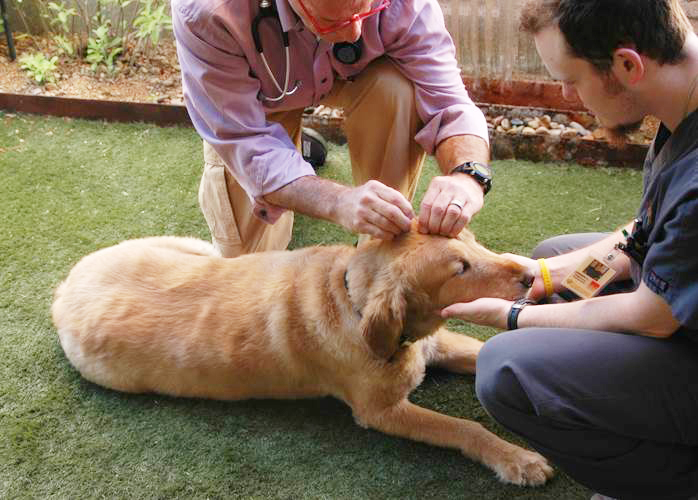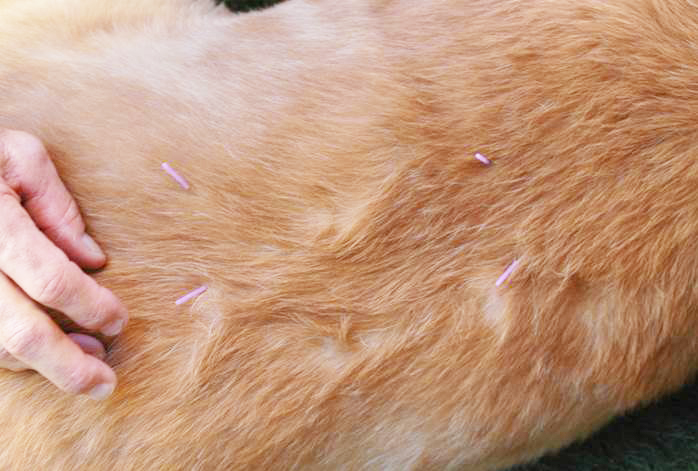
BY HEATHER FINN
Can you imagine taking Buster to the vet just to have him stuck head-to-toe with nearly 20 needles? Yes. We’re talking about acupuncture, the Chinese medicinal practice of using needles to stimulate different points on the body—for your pets.
It might sound like something a pet wouldn’t enjoy at all, but Dr. Randy Aronson, veterinarian and owner of Partners in Animal Wellness Services in Tucson, says your pup probably doesn’t mind.
“In the United States, we’re needle-phobic—we see needles and we get really upset,” Aronson says. “But these are incredibly sharp Chinese needles that rarely cause pain, and so our animals tolerate them beautifully.”
Turns out the acupuncture treatment that pets get isn’t all that different from what their owners get, either.
“Some of it is just based on how humans are upright and animals are on four legs, but most of the points are the same and have the same function as they do on people,” says Dr. Betsy Hershey, owner of Integrative Veterinary Oncology in Phoenix.
Acupuncture may help with pain, however, it can be used to treat your furry friends for a lot more. Hershey uses the treatment to help with ailments ranging from arthritis to heart and kidney conditions.
“Certainly most people think about it primarily for pain, but it’s got so many more uses—although it does help with that, as well,” Hershey says.
But why would someone turn to acupuncture for their pet rather than simply utilizing traditional Western medicine? Is acupuncture any more beneficial?
“A lot of Western medications kind of put a Band-Aid on the problem, but don’t really solve the problem,” Hershey says. “That’s where acupuncture, I think, helps the most, because we can actually rebalance the patient and treat the root of the problem instead of just masking the symptoms.”
Aronson agrees.
 “A lot of times, when you use your Western medicine, you create two more problems,” Aronson says. “When you give an NSAID (non-steroidal anti-inflammatory drug) to a dog, you can unfortunately affect his kidneys and liver really adversely.”
“A lot of times, when you use your Western medicine, you create two more problems,” Aronson says. “When you give an NSAID (non-steroidal anti-inflammatory drug) to a dog, you can unfortunately affect his kidneys and liver really adversely.”
Aronson says the use of acupuncture versus the use of traditional Western medicine is not an either/or situation, however.
“It’s not to say that we don’t use Western medicine, but we treat areas locally [with acupuncture] because we can get a local effect and a systemic effect with the needles, which allows us to use a lot less in the way of medication,” Aronson says. “We’ll use them together as a combination modality or treatment.”
It seems an owner has nothing to lose by adding acupuncture to Buster’s healthcare regimen. Hershey tends to agree, and says the only downside may be the time commitment— before being put on a monthly schedule, owners must initially bring in their pets once a week.
“If an owner can make that time commitment, there are absolutely no downsides,” Hershey says, adding that her practice’s $65-per-treatment fee makes acupuncture cheaper than some Western treatments. “There are no side effects of the treatment—if it’s performed appropriately—and in most cases, it helps improve the quality of life.”
According to the P.A.W.S. website, the knowledge and expertise of the vet is the most important thing to look for when searching for the right acupuncture treatment for your pet. So, next time you take your pup to the vet, don’t be afraid to ask about acupuncture treatments. Buster just might thank you.
Photos courtesy of P.A.W.S.





